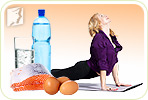Fatigue can put a strain on a woman's relationship, decrease her productivity at work, negatively affect her outlook on life, and compromise her social commitments. Luckily, women searching for effective fatigue treatments have a wide variety of options at their disposal.
Read on to discover the best fatigue treatments during menopause to give yourself a chance to feel alive again.
Three Approaches to Treating Fatigue
There are three approaches to treating fatigue: (1) Lifestyle changes, (2) Alternative medicine, and (3) Conventional medicine, which range from low-risk options to more invasive treatments. Women are recommended to start with the most natural options and continue to more advanced ones only if necessary.
Lifestyle Changes for Fatigue Treatment

The first level of treatment for fatigue involves the least amount of risk, though it does require the highest amount of self-discipline. Nevertheless, it can bring substantial improvements in symptom severity and frequency.
Nutritious Diet
A regular and well-balanced meal plan can help women not only stay nourished for optimal bodily functions, but also maintain proper energy levels throughout the day. A menopause diet should include a colorful array of foods that are rich in the following nutrients:
- Phytoestrogens are plant compounds with weak estrogenic actions that work to relieve fatigue by promoting hormonal balance in the body.
Soy, tofu, tempeh, flax
- Iron is important as well since its deficiency is often the underlying cause of fatigue among women at various life stages.1
Broccoli, chicken, eggs, apricots, spinach
- Omega-3 fatty acids have been found to help relieve fatigue, while also improving cardiovascular health and mood disorders.2
Salmon, flax, chia, walnuts, edamame
- Slow-release carbohydrates help the body maintain consistent energy levels and prevent sudden slumps.3
Quinoa, millet, sweet potatoes, brown rice
Regular Exercise
Leading a stationary lifestyle is one of the potential causes of fatigue. By staying active, women can not only treat fatigue and improve energy, but also control weight gain, battle mood swings, and relieve sleep disorders, all of which are common throughout the menopausal transition.
Amount: An ideal exercise routine consists of at least 150 minutes of low- to moderate-level physical activity per week, evenly broken up into shorter, 30-minute trainings.4
Type: The best exercise routines combine endurance workouts, like light jogging or swimming, with strength exercises, such as using resistance bands.
Useful tips: One of the best ways to make exercise for fatigue treatment stick is by making it fun. Women should opt for sports they enjoy, including dancing, hiking, or bike riding.
Precautions: To prevent fractures, it is best for middle-aged women to stay away from strenuous forms of exercise, like heavy weight lifting.5
Wholesome Habits
Women can complement their diets and exercise regimens with various wholesome habits, which - when practiced consistently - can help restore their energy levels and help them get through this life stage more empowered.
Reducing stress with yoga or meditation is a great way to treat fatigue by boosting energy levels, relaxing the body, and controlling stressors more effectively.6
Keeping a healthy balance between personal life and professional obligations as well as setting boundaries is an important part of treating fatigue and boosting energy.
Following a regular sleep schedule, such as sleeping for seven to nine hours per night and reducing daytime naps, is key in fatigue treatment as poor sleep quality can further worsen symptoms.7
Joining a support group can give women adequate resources to find proper treatment and relief from fatigue, especially when due to psychological causes.
Avoiding smoking and excessive alcohol drinking can help treat fatigue as both can disrupt the nervous system, sleep patterns, and energy levels.8
Alternative Medicine for Fatigue Treatment

Considered affordable and low-risk, alternative medicine can be highly effective in treating fatigue, especially alongside lifestyle changes. They cause no side effects and tackle the underlying cause of symptoms, hormonal imbalance.
There are two kinds of herbs that may be used in the treatment for fatigue: phytoestrogenic and hormone-regulating supplements.
Phytoestrogenic Supplements
Phytoestrogenic herbs, such as ginseng and chasteberry, contain plant-based compounds that resemble estrogen. By introducing these estrogenic compounds into the body, these supplements help to correct an estrogen deficiency and mitigate hormonal fluctuations. However, adding outside hormones to the body can directly reduce its capability to produce its own hormones. In the long term, this may cause an even greater drop in hormone levels.
Hormone-Regulating Supplements
Hormone-regulating supplements do not contain plant estrogens or any external hormones. Rather, they promote natural hormone production by nourishing the endocrine glands. This results in a balance of not only estrogen, but progesterone and testosterone levels as well, thus relieving fatigue. These supplements are considered the safest and most effective fatigue treatment options since they lack side effects and stimulate hormone production from within.
From Nature and Health Magazine, Dr. Chacon says:
"Macafem's nutrients help restore natural hormones in women. Unlike hormone drugs, which are basically resumed in taking synthetic hormones, Macafem acts totally different in your body. It nourishes and stimulates your own natural hormone production by inducing the optimal functioning of the pituitary and endocrine glands." Click on the following link to learn more about Macafem.
A combination of lifestyle changes and herbal supplements is usually the most effective treatment for fatigue. However, severe symptoms may require a more conventional treatment method, namely medications and psychotherapy.
Medications for Fatigue Treatment

Conventional medicine for fatigue treatment carries the highest risk and is often the costliest as well. It consists of medications and psychotherapy, which can be used separately or on conjunction with one another for best results.
Medications
While some medications target the underlying cause of fatigue, others are only used to relieve symptoms. The choices of medications for fatigue may include the following:
Cause-specific medications might include those to treat kidney disease, diabetes, infections, depression, or liver disorders, among others.
Pain relievers, like acetaminophen or ibuprofen, may be prescribed for chronic fatigue syndrome in the case of muscle or joint pain as well as headaches and migraines.
Hormone replacement therapy (HRT) was once a popular treatment method for menopausal ailments, including fatigue. While it can still be a quick and powerful option, it involves serious side effects and increases the risk of blood clots, cancers, and heart disease, as seen in the following studies.
Psychotherapy
Undergoing psychotherapy, most commonly cognitive behavioral therapy (CBT), can be a valuable strategy for women whose fatigue results from unresolved depression, anxiety, or past traumas. It can be done on its own or in conjunction with medications.
The three aforementioned approaches to fatigue treatment can be applied in any combination, depending on symptom severity and life stage. Yet, a growing number of women manage to boost energy levels with a blend of healthy lifestyle changes and hormone-regulating supplements without ever relying on risky treatments.
A Safe Way of Treating Fatigue
Implementing Lifestyle Changes:
- Loading up on foods rich in phytoestrogens, iron, omegas, and complex carbs
- Keeping up with regular exercise at least 30 minutes a day, 5 times a week
- Relieving stress through yoga, meditation, and deep breathing exercises
- Maintaining a regular sleep schedule and quitting unhealthy habits
And Taking Herbal Supplements:
- Phytoestrogenic herbal supplements, like chasteberry
- Or natural hormone-regulating supplements, like Macafem
Sources
- Better Health Channel. (2015). Fatigue. Retrieved July 9, 2020 from https://www.betterhealth.vic.gov.au/health/conditionsandtreatments/fatigue
- Harvard Health Publishing. (2018). Chronic Fatigue Syndrome. Retrieved July 9, 2020 from https://www.health.harvard.edu/a_to_z/chronic-fatigue-syndrome-a-to-z
- Medline Plus. (2019). Fatigue. Retrieved July 9, 2020 from https://medlineplus.gov/ency/article/003088.htm
- National Institute on Aging. (2019). Fatigue in Older Adults. Retrieved July 9, 2020 from https://www.nia.nih.gov/health/fatigue-older-adults
- Office on Women's Health. (2019). Chronic fatigue syndrome. Retrieved July 9, 2020 from https://www.womenshealth.gov/a-z-topics/chronic-fatigue-syndrome
- The Primary Care Companion to the Journal of Clinical Psychiatry. (2002). Clinical Dimensions of Fatigue. Retrieved July 9, 2020 from https://www.ncbi.nlm.nih.gov/pmc/articles/PMC181235/
Footnotes:
- CMAJ. (2012). Effect of iron supplementation on fatigue in nonanemic menstruating women with low ferritin: a randomized controlled trial. Retrieved July 9, 2020 from https://www.ncbi.nlm.nih.gov/pmc/articles/PMC3414597/
- Nevada Journal of Public Health. (2010). Carbohydrate Consumption and Fatigue: A Review. Retrieved July 9, 2020 from https://digitalscholarship.unlv.edu/cgi/viewcontent.cgi?article=1011&context=njph
- Omegas: Marrero-Castro, J. et al. (2018). Low omega-3 index and polyunsaturated fatty acid status in patients with chronic fatigue syndrome/myalgic encephalomyelitis. Retrieved July 9, 2020 from https://pubmed.ncbi.nlm.nih.gov/30471769/
- American Heart Association. (2018). Recommendations for Physical Activity in Adults. Retrieved July 9, 2020 from https://www.heart.org/en/healthy-living/fitness/fitness-basics/aha-recs-for-physical-activity-in-adults
- Chronic Diseases and Translational Medicine. (2015). Primary osteoporosis in postmenopausal women. Retrieved July 9, 2020 from https://www.ncbi.nlm.nih.gov/pmc/articles/PMC5643776/
- BMC Psychiatry. (2017). Associations of fatigue to work-related stress, mental and physical health in an employed community sample. Retrieved July 9, 2020 from https://www.ncbi.nlm.nih.gov/pmc/articles/PMC5420158/
- National Institute on Aging. (2019). A Good Night's Sleep. Retrieved July 9, 2020 from https://www.nia.nih.gov/health/good-nights-sleep
- Better Health Channel. (2015). Fatigue Fighting Tips. Retrieved July 9, 2020 from https://www.betterhealth.vic.gov.au/health/ConditionsAndTreatments/fatigue-fighting-tips
- JAMA. (2002). Risks and benefits of estrogen plus progestin in healthy postmenopausal women: principal results from the Women's Health Initiative randomized controlled trial. Retrieved July 9, 2020 from https://www.ncbi.nlm.nih.gov/pubmed/12117397
- The Lancet. (2019). Type and timing of menopausal hormone therapy and breast cancer risk: individual participant meta-analysis of the worldwide epidemiological evidence. Retrieved July 9, 2020 from https://www.thelancet.com/journals/lancet/article/PIIS0140-6736(19)31709-X/fulltext



